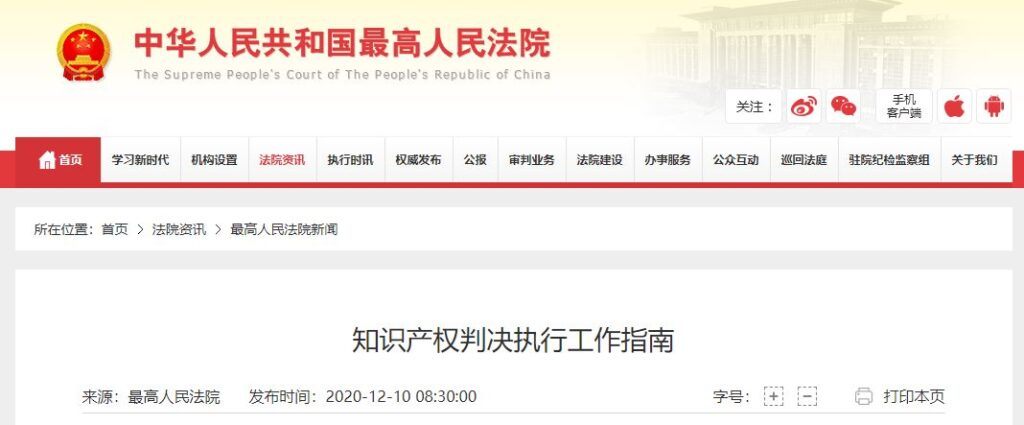On December 10, 2020, China’s Supreme People’s Court released “Guidelines for Enforcement of Intellectual Property Judgments” (知识产权判决执行工作指南). The Guidelines have 29 Articles that cover the types of cases the Guidelines cover; enforcement of civil intellectual property cases; enforcement of intellectual property administrative cases; and enforcement of criminal intellectual property cases.
A brief summary of the Guidelines follows.
The scope of cases includes civil (copyright, trademarks, patents, trade secrets, unfair competition, new plant varieties, integrated circuit layout designs, etc.), administrative (copyright, trademark, patent, trade secret, new plant varieties, integrated circuit layout designs, unfair competition, etc.) and criminal cases under Chapter 3, Section 7 of the Criminal Law of the People’s Republic of China.
Parties can apply for evidence preservation before or during litigation. The applicant shall be ordered to provide the property preservation guarantee in an amount not exceeding 30% of the requested preservation amount. Preservation guarantees shall be equivalent to the losses that the respondent may have suffered as a result of the execution of the preservation measures, including reasonable losses such as sales income and storage costs of the products involved in the order to stop the infringement.
Courts can enforce judgements but applications for enforcement must be made within 2 years. The period of application for execution shall be calculated from the last day of the performance period stipulated in the judgement; if the judgement stipulates the performance in installments, it shall be calculated from the last day of each performance period specified; if the judgement does not specify the performance period, it shall be calculated from the effective date of the judgement.
If the person subject to enforcement refuses to report property for the purpose of execution of a judgement, or makes false reports or delays reporting without justifiable reasons, that person can be fined or detained and criminally prosecuted if the actions constitute a crime. The person can also be added to a blacklist of untrustworthy persons (which may limit the person’s ability to travel, get loans, etc.).
The seizure, or freezing of the property of the person subject to enforcement by a Court shall be limited to the amount of its value sufficient to pay off the creditor’s rights determined in the judgement and the enforcement costs, and the amount in excess shall not be sealed, seized or frozen.
Bank accounts and online accounts (e.g., Alipay) can be frozen for up to one year, movable property can be frozen for up to two years while intellectual property , real property and equity can be frozen for up to three years. Extensions are available.
If the person subject to execution fails to perform the payment obligations determined by the effective judgement, the person applying for execution may apply for the execution of measures to restrict consumption of the person subject to execution, restricting their high consumption and related consumption not necessary for daily life or business; and may apply for restricting the person from leaving the country. If it meets the statutory circumstances, the applicant can also apply for the person subject to executing be included in a blacklist of untrustworthy persons subject to enforcement. Further, the People’s Court can fine or detain the person and the person cam be criminally prosecuted if the actions constitute a crime.
The Court should dispense the execution money to the creditor within 30 days of receipt.
Enforcement by a Court should take no longer than about 6 months.
For administrative judgements, if the administrative agency doesn’t enforce a judgement, the relevant party may apply to a Court for enforcement. The deadline to apply for enforcement is 2 years similar to that for civil cases.
For criminal cases, the Courts can enforce:
